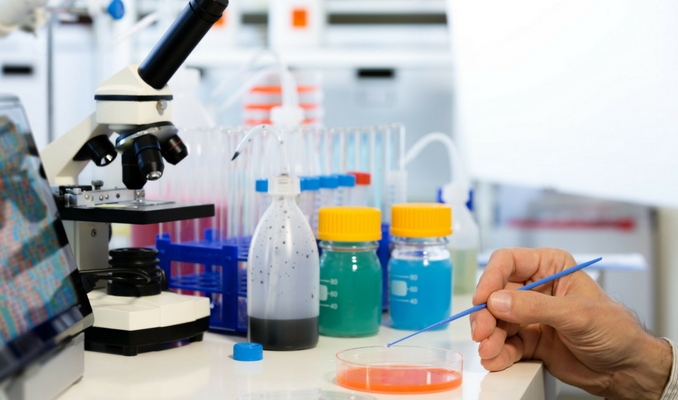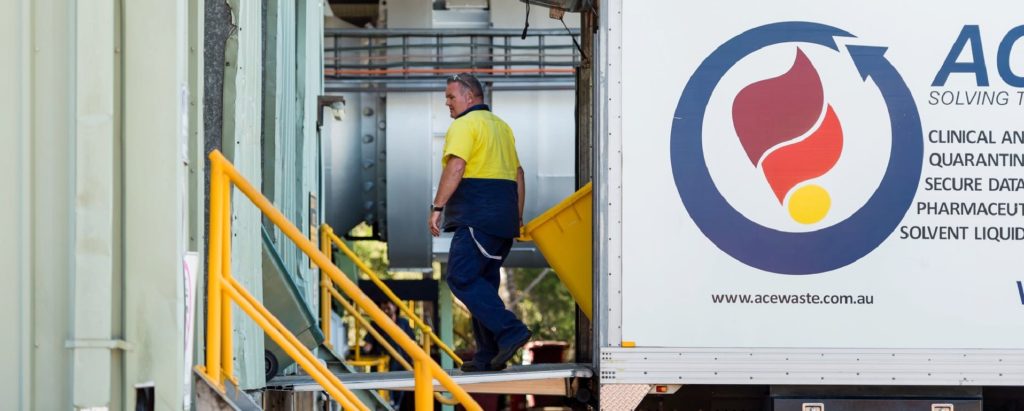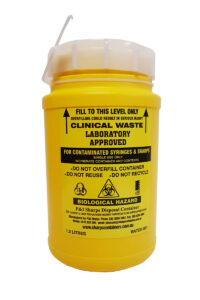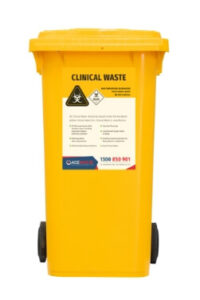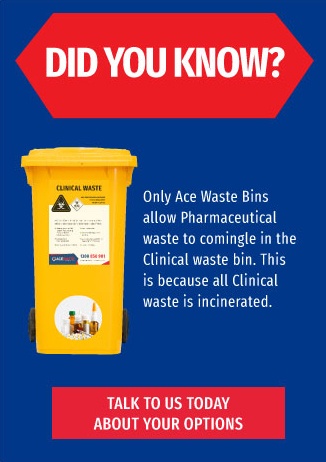Owning, managing or working in a laboratory can be a rewarding yet challenging job. Amongst the pressure of research and deadlines lies a vital task that technicians and supervisors can sometimes overlook: laboratory chemical waste disposal.
Most will understand the importance of correctly handling and disposing of hazardous chemical lab waste, such as cleaning agents, solvents and compressed gases. However, with all the varying state and government regulations, it can be tricky to monitor without professional support. Luckily, Ace Waste is here to provide valuable knowledge and solutions to ensure you are protected from potentially hazardous and costly infringements.
Types of Chemical Lab Waste
Laboratories use a diverse range of materials for testing, research and other purposes, hence producing many types of chemical waste.
The main types include:
- Oxidizers and Gas Cylinders.
- Flammable liquids.
- Paints and Solvents.
- Glues and Adhesives.
- Pharmaceuticals.
- Pesticides and Herbicides.
- Acids and Alkalis.
- Poisons and Toxins.
- Expired or deteriorated chemicals.
Chemical lab waste is considered hazardous due to its potential to cause serious health, safety and environmental harm. Therefore, any laboratory that uses these substances, such as pathology centres, education sectors, research labs, etc., is responsible for storing, handling and disposing of them according to industry and state laws.
In Australia, Safety Data Sheets (SDS) contain important information about chemical properties and hazards. If you supply, use or store hazardous chemicals in your laboratory, you must ensure the SDS are accessible to all workers.
LEARN MORE ABOUT LABORATORY WASTE
Best Practices for Storing Chemical Lab Waste
Because of its hazardous nature, chemical lab waste must be clearly labelled and stored in compatible containers before disposal. For example, most acids must be kept in glass containers instead of metal, as over time, the chemical properties will cause the metal to rust and disintegrate. In addition, all containers should be leak-proof and tightly sealed to avoid any chance of spillage.
To avoid physical or environmental damage, we recommend that all workers:
- Segregate organic solvents, toxic metals, inorganic chemicals, chlorinated organic solvents, and bulk oils (e.g. automotive or cooking).
- Do not mix recyclable oils with any oils contaminated with solvents, halogens, laboratory chemicals and fuels.
- Avoid overfilling liquid waste cases.
- Keep solid and liquid waste separate.
- Ensure reliable secondary containment is available (spill trays or binding)
Furthermore, empty chemical packaging may only be discarded in general waste streams if:
- There is no chance of hazardous residues.
- All labels and lids have been removed.
Ace Waste has a wide range of waste bins and containers for chemical waste, as well as providing full collection and disposal services
GET A FREE LAB WASTE QUOTE TODAY
Practical Ways to Reduce Chemical Lab Waste
While some hazardous substances are essential to the functionality of laboratories, there are some strategies you can use to minimise the production of chemical waste. These include:
- Monitoring and restricting chemical orders to a reasonable amount.
- Using less hazardous compounds and materials where possible.
- Employ staff to clear out old chemical stocks by returning them or organising correct collection and disposal.
- Ensure managers and technicians keep periodic inventories of all chemicals.
- Implement regular waste management training and display procedure signs to guide staff.
Ace Waste has over 25 years in laboratory chemical waste disposal. Our knowledgeable team stays on top of all state laws and government regulations across QLD and VIC. We will work with you to devise a waste management plan tailored to your needs, no matter how large or complex your laboratory may be.
Biological and Sharps Disposal
In addition to chemical lab waste, laboratories can also produce infectious or clinical waste – any material with the potential to cause or spread human disease, including:
- Biological matter, including blood, bodily fluids, human remains etc.
- Sharps such as needles and scalpels.
- Any equipment or material that has come into contact with the above.
Ace Waste can assist in the handling and disposal of:
- Medical sharps.
- Non-contaminated sharps.
- Biohazardous contaminated sharps.
- Chemically contaminated sharps.
Our range of trusted sharps bins and containers are clinically designed to reduce the risk of sharps injuries. Browse our full range here or check out our current favourites below.
Managing Cytotoxic Waste in Laboratories
Cytotoxic Waste is any material exposed to or contaminated by Cytotoxic drugs during cancer treatment or research, specifically chemotherapy. As they contain toxic chemicals that cause severe side effects to the body, it must be stored in the right cytotoxic waste bin and handled and disposed of with extreme caution.
Learn more about Cytotoxic Waste Disposal HERE
Total Waste Management Solutions
Ace Waste delivers end-to-end support that abides by QLD and VIC licensing requirements and codes of practice. Our EPA-approved incineration facilities ensure that all hazardous and clinical waste is completely destroyed, while our extensive range of sturdy bins and containers ensure a safe and clean working environment.
Avoid costly penalties, reduce your environmental impact and protect your facility today, by contacting the Ace Waste team.

